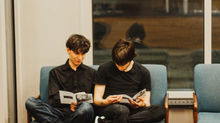Director's Thoughts
- Tara Tamburello
- Jun 10, 2016
- 3 min read

I’ve participated in two new play experiments, and I was a director both times. I also write and act—and am much more experienced with both of those—so when I found out I was directing I was simultaneously relieved (How on earth could I write a play in 24 hours, or even memorize all those lines?) and disappointed. I felt like the role of director meant “being the boss,” and I don’t like being the boss. I thought a good director needed to be a visionary, big ideas person,and I’m not really that either. I like to tinker and experiment, and I love a good flash of insight—but I rarely brainstorm for the fun of it, and especially not out loud.
I think participating in the new play experiments helped me realize that the characteristics I bring to the table are good leadership qualities too. I don’t like being the boss, but I do care about getting everyone’s needs met: as director, I kept track of the time and made sure that we used it well (for creating, practicing, and sleeping!). And my preference for playing with ideas, rather than generating them, turned out to be pretty good for the process as well: there were so many ideas in the room already! The writer had ideas; the actors had ideas. It was really fun facilitating the conversations between everyone at the beginning of both projects. There was a lot of excitement in those rooms.
Here are my favorite moments from each experiment…
The first, in 2008: We’d been given a flashlight as a must-use prop, and me and one of the other directors went into the theater while it was dark to figure out what sort of interesting lighting stuff a flashlight could do. I had so much fun just playing with the light. My group ended up performing our entire play in the dark, with the flashlight as the only light source. It was very moody and eerie—downright cool—and really complemented the abstract, disorienting tone of the piece.
The second, in 2013: The play took place between a husband and wife around a dinner table,and there was a point where both actors kept ending up behind the table. Every time we got to this point, it was clear that they both were struggling: the delivery of their lines got a bit bungled,and they weren’t sure what to do with their bodies. I said something like, “It seems like you guys are both feeling sort of awkward at this part,” and they both said, “Yes!” So we ran through that part a few times, experimenting with different blocking options. The actors came up with somethings, I suggested some things—and after about 10 minutes we’d found a solution to the problem. I was so happy that pointing out and addressing the messy, broken spot helped—helped the actors feel more grounded and confident and helped the piece run more smoothly overall.

I learned that I could be a good leader, and that being a leader didn’t necessarily mean acting like the boss. It meant helping the other talented people on my team do their best work. It meant having an editor’s eye, helping to smooth out the rough patches and drawing focus to the interesting or important elements.
Both times I was amazed that we were able to whip up such great pieces in such a short amount of time. We were trying to do something impossible, and since everybody stayed hopeful and positive we were able to pull it off—and pull it off really well! I loved both experiences."































Comments